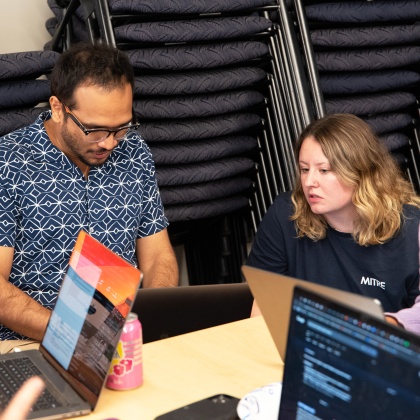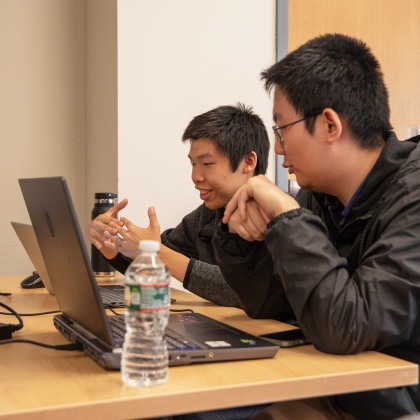MITRE and its sponsors are dedicated to tackling the fight against child abuse and predation online. For its fifth “Hackathon for Good” in just one year, the team is returning to UMass Amherst to create new tools to help law enforcement.

Volunteers Join UMass Amherst for Hackathon to Fight Child Abuse Online

In 2023, MITRE launched its Hackathon-for-Good series to partner with other nonprofits working to combat child exploitation. One of MITRE's first partners was UMass Amherst. In just 8 hours, 20 volunteers gathered to create approaches and tools to combat online child abuse. They collaborated to train models that ensured web sites and apps delivered content to match the age designations that protect kids online.
It was a great success, and since that gathering MITRE engineers Adam Hammond, Leslie Anderson, and others have hosted four similar events.
In October, Hammond and the team returned to UMass, again focused on creating open-source tools for law enforcement and nonprofits fighting online child abuse.
Working alongside industry experts from MITRE allowed our students to gain invaluable insights and practical experience.
An Ongoing Mission to Protect Children

In the fight against human trafficking and online abuse, MITRE works closely with law enforcement partners through sponsor engagements in our Intel Center and the Center for Securing the Homeland.
"My goal was to make MITRE a better partner in the fight against human trafficking," Hammond explained. By creating hackathons to address specific challenges, MITRE volunteers deliver greater impact in limited time.
One of the unique benefits of hackathons is their collaborative nature. Students and senior engineers work together to build tools that can have a real-world impact. Everyone benefits.
“Working alongside industry experts from MITRE allowed our students to gain valuable insights and practical experience, bridging the gap between academic theory and real-world application,” says Professor Brian Levine, director of the Cybersecurity Institute.
The students involved will take the products back to the classroom, gaining experience while helping to further refine and develop the tools.
“Additionally, the goal of the hackathon was to advance our efforts to create an open-source application that increases the availability and responsible use of advanced machine learning techniques by investigators of crimes against children.
Helping Organizations Access Engineering Expertise
Through hackathons like these, MITRE has delivered impact to organizations, including nonprofits like Collective Liberty and the National Child Protection Task Force. “Smaller organizations don’t have the budget to engineer the tools they need,” Hammond says. “MITRE engineers have the expertise where they can come in, work with students, and do in a single day something these organizations would take months or even years to fund and create.”
Previous events have not only produced valuable tools but have also provided a steady supply of volunteers for partner organizations. "Some of our volunteers start working with these nonprofits more consistently, going back to them and helping them tackle engineering problems," Hammond said.
Looking ahead, Hammond and the team dream of greater collaborations on the horizon—including a hackathon that brings law enforcement to MITRE for a large-scale operation to close cold cases.
With the ideas and tools developed in these hackathons, they’ll have the capabilities they need to do it.